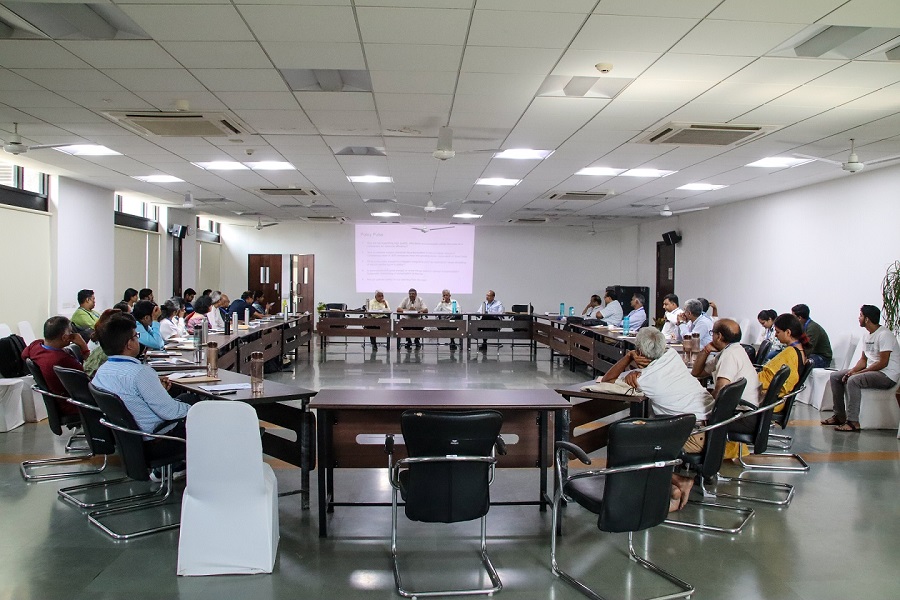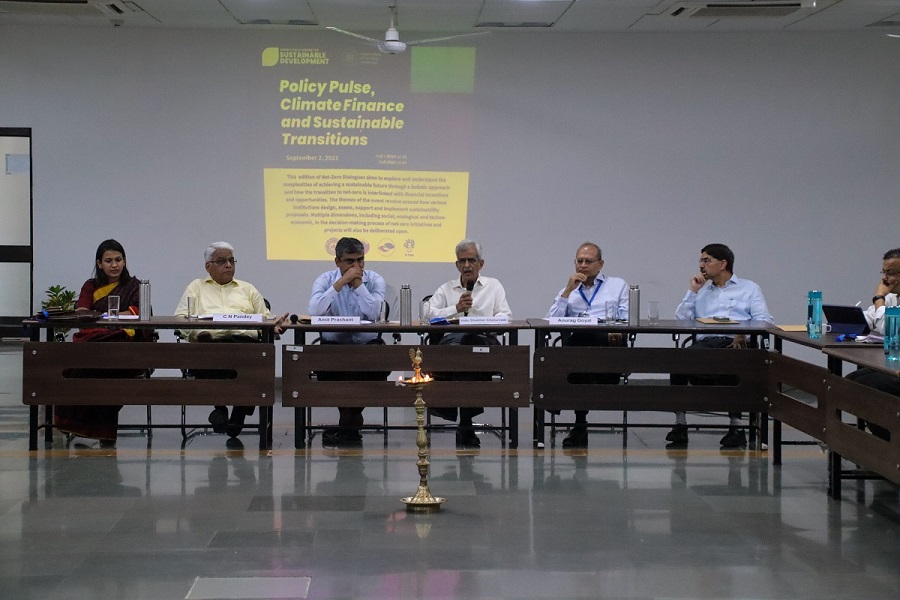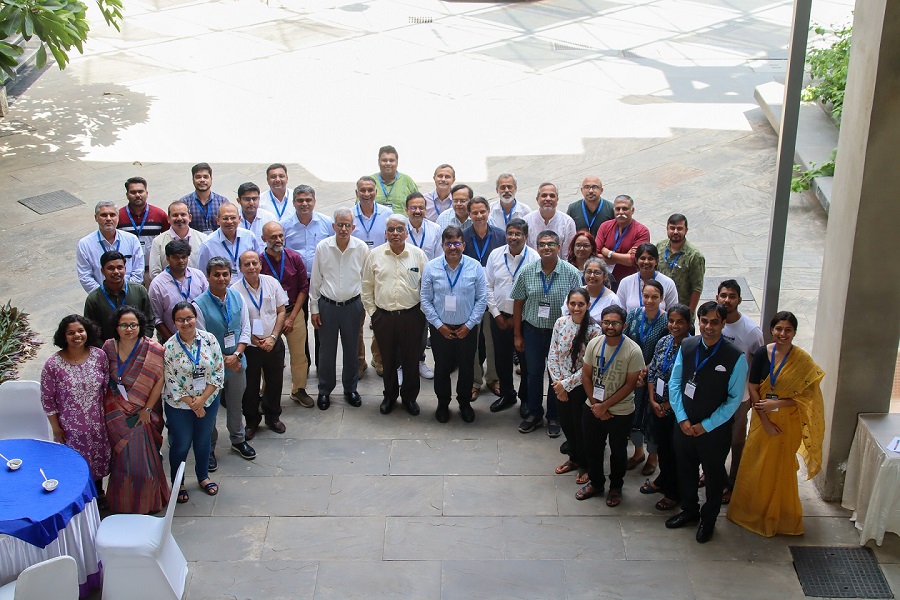STORY CREDITS
Writer/Editor: Shivangi Vasudev Bhatt
Photo: Media and Communication, IIT Gandhinagar
Indian Institute of Technology Gandhinagar (IITGN), through its Dr Kiran C Patel Centre for Sustainable Development, in partnership with the 14 Trees Foundation; Chandrakanta Kesavan Center for Energy Policy and Climate Solutions, IIT Kanpur; and Ecological Society, Pune, organised ‘Net-Zero Dialogues’ – a one-day brainstorming session on various issues related to Climate Change and Sustainability on September 02, 2023.
Focused on the theme “Policy Pulse, Climate Finance, and Sustainable Transitions”, the event brought together nearly 50 experts from all over the country, including policymakers, academia, civil society, and industry representatives. The participants belonged to about 20 organisations including Government of India (Niti Aayog), Government of Gujarat (DDO Kheda), IIT Gandhinagar, IIT Kanpur, IIM Ahmedabad, NIAS Bangalore, IISER Pune, Gujarat University, Symbiosis International University, Gujarat Ecology Commission, Gujarat Cleaner Production Centre, WIN Foundation, Sprih, ATREE Bangalore, Climate Policy Initiative, IBM India Software Labs, Adani Private Limited, and Taru Leading Edge, among others.
In his inaugural address, Prof Indu Shekhar Chaturvedi, Former Secretary, Ministry of New and Renewable Energy, Government of India, who is also a Visiting Professor of Practice at IIT Kanpur, said that various policy questions for the transitions need to be addressed. During the inaugural session, Shri Anurag Goyal, Senior Advisor at Niti Aayog and Prof Amit Prashant, Dean R&D of IITGN, also addressed the participants. Prof Rajat Moona, Director IITGN, also addressed the participants during the day. He shed light on the issue of waste management and elucidated an example of the clothing industry and the resulting waste.
The event aimed at seeking solutions for the difficulties in achieving a sustainable future through a holistic approach and how the transition to net zero is interlinked with financial incentives and opportunities. The event’s themes revolved around how various institutions design, assess, support, and implement sustainability proposals. Multiple dimensions, including social, ecological and techno-economic, in the decision-making process of net-zero initiatives and projects were also discussed.
The proceedings started with an introduction and background of the event by Dr Pravin Bhagwat, Founder of 14 Trees Foundation; Mr Ajay Phatak, Trustee, Ecological Society; and Prof Ashish Garg of the Department of Sustainable Energy Engineering of IIT Kanpur. They briefed the gathering about the previous two editions of the Net-Zero Dialogue and outlined the expected line of discussions about the current Third Edition of the Net Zero Dialogue.

Presentation was made by 14 Trees Foundation regarding their exemplary work in engaging people in eco-restoration at Pune. They made a point that ecological conservation may be used for driving development.
Subsequently, three brainstorming sessions were dedicated to Policy Pulse, Climate Finance, and Sustainable Transitions, in which the experts discussed current issues and future challenges in each theme.
The Climate Finance session deliberated several aspects of institutional strategies for a sustainable economy, including holistic approach and policy integration, global cooperation, financially viable projects, and investments in mitigation and adaptation. The discussion was led by Prof Amit Garg of IIM Ahmedabad in which several experts participated, including Prof Mousami Prasad of IIT Kanpur, Mr Binu Mathew from Taru Leading Edge, Ms Neha Khanna of Climate Policy Initiative, Dr Vidhee Avashia of IIM Ahmedabad, and Prof Shweta Singh of Gujarat University. Prof Vimal Mishra of IIT Gandhinagar moderated the session. It was emphasised that the Adaptation Funds can be distributed across several projects. Discussions also ensued on what needs to happen for the financial rebuilding of natural capital and circular economy promotion, the importance of private sector involvement, green taxonomy, and fair distribution of funds.

The session on Policy Pulse delved into government initiatives for a sustainable future. It emphasised the interconnectedness of policies in different sectors and policy impetus towards R&D. The discussions were led by Prof Indu Shekhar Chaturvedi, and several experts shared their views, including Mr Anurag Goyal; Dr J R Bhatt, Former Advisor to the Ministry of Environment, Forest and Climate Change, Government of India, and Adjunct Professor at NIAS, Bangalore; Prof Vaibhav Chowdhury and Prof Rajeev Jindal from IIT Kanpur; and Ms Anuja Malhotra of ATREE Bangalore. Prof C N Pandey of IITGN moderated the session and shared his views on the Policy. It was discussed that policies should be dynamic and science and evidence-based. The need for behavioural changes and staying competitive in international markets were also discussed.
The session on Sustainable Transitions discussed the multidimensionality of net-zero initiatives. It indicated the need for cognisance of the scale of energy, localisation and circularity of resource use and highlighted the restoration and conservation of resources for sustainable transitions. Mr Ajak Phatak was the lead speaker of the session, which was moderated Dr J R Bhatt with inputs from several members, including Ms Poonam Mehta, Joint Commissioner at the Urban Development Department, Pune; Prof Bejoy Thomas, Associate Professor at IISER Pune; Mr Sudhanshu Jangir of Gujarat University; and Mr Paresh Vora of WIN Foundation. The immense importance of community engagement for inclusive sustainability and the use of innovation and technology were also discussed. Experts underlined that growth and development should be socio-ecological and not only techno-economic. We need to consider transitions not only from energy but also from all aspects of life.
Ms Shivani Goyal (IAS), District Development Officer of Kheda, reiterated the need for capacity building at the grassroots level and making environmental conservation a mass movement.
The event concluded with summarising the key takeaways from each session by Prof C N Pandey, Coordinator, Centre for Sustainable Development at IITGN.
This news has been covered by some of the leading Indian newspapers and media agencies. Click on the links below to read more.

